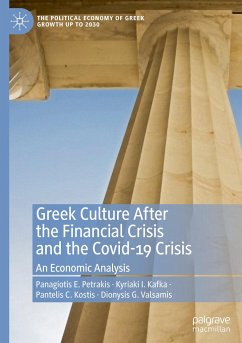Panagiotis E. Petrakis, Kyriaki I. Kafka, Pantelis C. Kostis
Greek Culture After the Financial Crisis and the Covid-19 Crisis
An Economic Analysis
Panagiotis E. Petrakis, Kyriaki I. Kafka, Pantelis C. Kostis
Greek Culture After the Financial Crisis and the Covid-19 Crisis
An Economic Analysis
- Gebundenes Buch
- Merkliste
- Auf die Merkliste
- Bewerten Bewerten
- Teilen
- Produkt teilen
- Produkterinnerung
- Produkterinnerung
This book studies the evolution in human thought, action, and behavior as a
result of the 2008 fi nancial crisis and the Covid-19 crisis. Through the presentation
and analysis of data, as recorded for at least a decade, and using the Greek
economy as a case study, the authors examine the changes in social and human
capital, increasingly risk-averse behavior, and changes in people's general psyche
and economic action in Greek society and economy.
Andere Kunden interessierten sich auch für
![Greek Culture After the Financial Crisis and the Covid-19 Crisis Greek Culture After the Financial Crisis and the Covid-19 Crisis]() Panagiotis E. PetrakisGreek Culture After the Financial Crisis and the Covid-19 Crisis44,99 €
Panagiotis E. PetrakisGreek Culture After the Financial Crisis and the Covid-19 Crisis44,99 €![Has the Financial Crisis Induced a Credit Crunch for Small and Medium-Sized Enterprises in Germany? Has the Financial Crisis Induced a Credit Crunch for Small and Medium-Sized Enterprises in Germany?]() Christopher HeineHas the Financial Crisis Induced a Credit Crunch for Small and Medium-Sized Enterprises in Germany?47,95 €
Christopher HeineHas the Financial Crisis Induced a Credit Crunch for Small and Medium-Sized Enterprises in Germany?47,95 €![From Itinerant Trade to Moneylending in the Era of Financial Inclusion From Itinerant Trade to Moneylending in the Era of Financial Inclusion]() Martin FottaFrom Itinerant Trade to Moneylending in the Era of Financial Inclusion89,99 €
Martin FottaFrom Itinerant Trade to Moneylending in the Era of Financial Inclusion89,99 €![Constructing a More Scientific Economics Constructing a More Scientific Economics]() Constructing a More Scientific Economics125,99 €
Constructing a More Scientific Economics125,99 €![Constructing a More Scientific Economics Constructing a More Scientific Economics]() Constructing a More Scientific Economics125,99 €
Constructing a More Scientific Economics125,99 €![From Itinerant Trade to Moneylending in the Era of Financial Inclusion From Itinerant Trade to Moneylending in the Era of Financial Inclusion]() Martin FottaFrom Itinerant Trade to Moneylending in the Era of Financial Inclusion59,99 €
Martin FottaFrom Itinerant Trade to Moneylending in the Era of Financial Inclusion59,99 €![The Real Wealth of Nations The Real Wealth of Nations]() Riane EislerThe Real Wealth of Nations41,99 €
Riane EislerThe Real Wealth of Nations41,99 €-
-
-
This book studies the evolution in human thought, action, and behavior as a
result of the 2008 fi nancial crisis and the Covid-19 crisis. Through the presentation
and analysis of data, as recorded for at least a decade, and using the Greek
economy as a case study, the authors examine the changes in social and human
capital, increasingly risk-averse behavior, and changes in people's general psyche
and economic action in Greek society and economy.
result of the 2008 fi nancial crisis and the Covid-19 crisis. Through the presentation
and analysis of data, as recorded for at least a decade, and using the Greek
economy as a case study, the authors examine the changes in social and human
capital, increasingly risk-averse behavior, and changes in people's general psyche
and economic action in Greek society and economy.
Produktdetails
- Produktdetails
- The Political Economy of Greek Growth up to 2030
- Verlag: Palgrave Macmillan / Springer International Publishing / Springer, Berlin
- Artikelnr. des Verlages: 978-3-030-81017-7
- 1st edition 2021
- Seitenzahl: 300
- Erscheinungstermin: 30. August 2021
- Englisch
- Abmessung: 216mm x 153mm x 21mm
- Gewicht: 503g
- ISBN-13: 9783030810177
- ISBN-10: 3030810178
- Artikelnr.: 62048034
- Herstellerkennzeichnung
- Books on Demand GmbH
- In de Tarpen 42
- 22848 Norderstedt
- info@bod.de
- 040 53433511
- The Political Economy of Greek Growth up to 2030
- Verlag: Palgrave Macmillan / Springer International Publishing / Springer, Berlin
- Artikelnr. des Verlages: 978-3-030-81017-7
- 1st edition 2021
- Seitenzahl: 300
- Erscheinungstermin: 30. August 2021
- Englisch
- Abmessung: 216mm x 153mm x 21mm
- Gewicht: 503g
- ISBN-13: 9783030810177
- ISBN-10: 3030810178
- Artikelnr.: 62048034
- Herstellerkennzeichnung
- Books on Demand GmbH
- In de Tarpen 42
- 22848 Norderstedt
- info@bod.de
- 040 53433511
Panagiotis E. Petrakis is Professor in the Department of Economics at National and Kapodistrian University of Athens, Greece, where he serves as Scientifi c Coordinator of Distance Education Training Programs. He was chairman of the Department of Economics at National and Kapodistrian University of Athens from 2005 to 2009. He is the author of numerous scientifi c articles and monographs and has extensive publications in recognized academic journals on economic development, entrepreneurship, and cultural background. Kyriaki I. Kafka is Adjunct Lecturer of Economics at the National and Kapodistrian University of Athens / Department of Economics. She has published books and articles in distinguished academic journals including Journal of Comparative Economics, Journal of Business Research and Journal of Innovation and Knowledge, and her research interests include economic development and growth, cultural economics, institutional economics, entrepreneurship, and innovation. Pantelis C. Kostis is Adjunct Lecturer of Economics at the National and Kapodistrian University of Athens / Department of Economics and the Hellenic Open University, Greece. His research has been published in distinguished international academic journals including Journal of Comparative Economics, Journal of Business Research, Economic Modelling and the Journal of Socio- Economics. He is also the co-author of several books regarding the European and the Greek economy, and economic development and growth. Dionysis G. Valsamis is a Researcher in the Department of Economics at the National and Kapodistrian University of Athens, Greece. He is the co-author of two books and has published articles in academic journals. His research interests include monetary policy, economic growth, and the implementation of economic policies in Europe.
Part I: The Basics of Cultural Background.- Chapter 1: Introduction.- Chapter 2: Human Needs and Actions.- Chapter 3: Behavioral Identity.- Chapter 4: The Big-Five Personality Characteristics.- Part II: Attitudes and Behaviors.- Chapter 5: Happiness, Life Satisfaction, Health and Political Self-Determination.- Chapter 6: Principles and Beliefs.- Chapter 7: Creativity, Incentives and Attitudes to Life.- Chapter 8: Social Behaviors.- Chapter 9: Voting Intention, Rationalism, Welfare State and Happiness.- Part III: Attitudes on Economic Policy.- Chapter 10 Economy and Economic Policy.- Chapter 11: Public Sector and Investments.- Chapter 12: State, Taxation and State Welfare.- Part IV: Risk Preferences, Loss Aversion and Rationality.- Chapter 13: Rationality and Loss Aversion.- Chapter 14: The Global Preference Survey: Attitudes towards Risk, Positive and Negative Reciprocity and Altruism.- Part IV: Social Behavior Hypothesis.- Chapter 15: he Dipoles of Social Behaviors.- Chapter 16: Testing the Basic Social Modernization Theories.
Part I: The Basics of Cultural Background.- Chapter 1: Introduction.- Chapter 2: Human Needs and Actions.- Chapter 3: Behavioral Identity.- Chapter 4: The Big-Five Personality Characteristics.- Part II: Attitudes and Behaviors.- Chapter 5: Happiness, Life Satisfaction, Health and Political Self-Determination.- Chapter 6: Principles and Beliefs.- Chapter 7: Creativity, Incentives and Attitudes to Life.- Chapter 8: Social Behaviors.- Chapter 9: Voting Intention, Rationalism, Welfare State and Happiness.- Part III: Attitudes on Economic Policy.- Chapter 10 Economy and Economic Policy.- Chapter 11: Public Sector and Investments.- Chapter 12: State, Taxation and State Welfare.- Part IV: Risk Preferences, Loss Aversion and Rationality.- Chapter 13: Rationality and Loss Aversion.- Chapter 14: The Global Preference Survey: Attitudes towards Risk, Positive and Negative Reciprocity and Altruism.- Part IV: Social Behavior Hypothesis.- Chapter 15: he Dipoles of Social Behaviors.- Chapter 16: Testing the Basic Social Modernization Theories.








